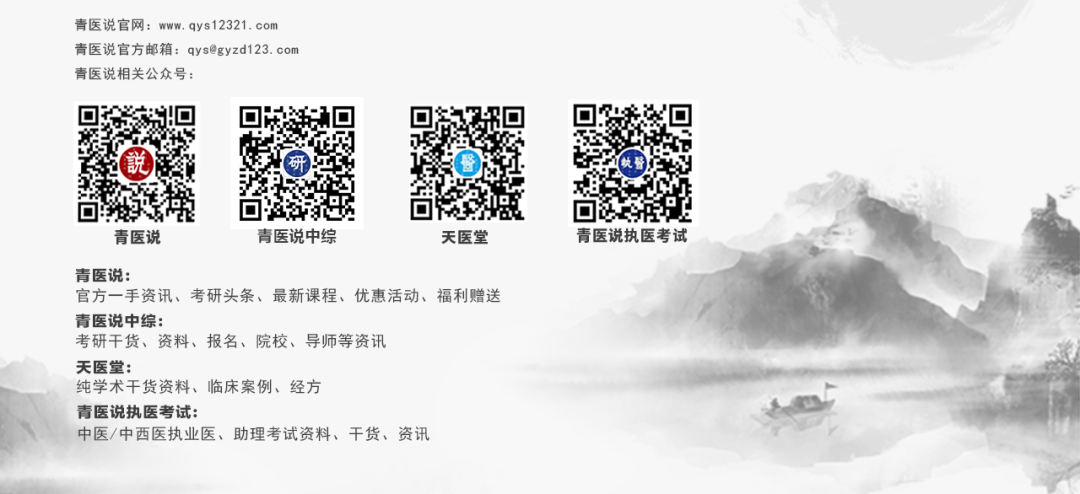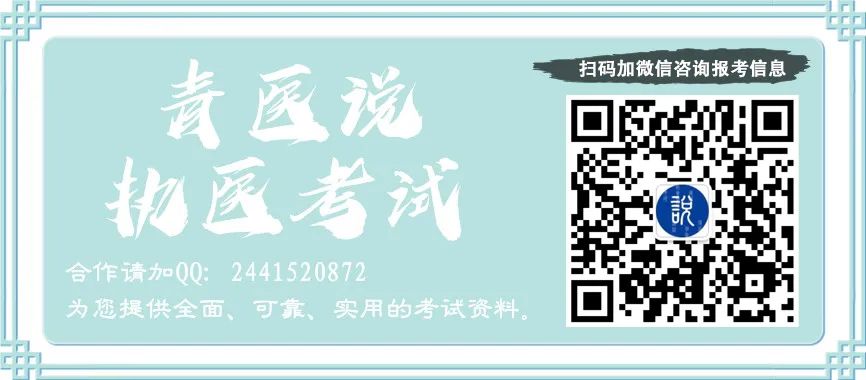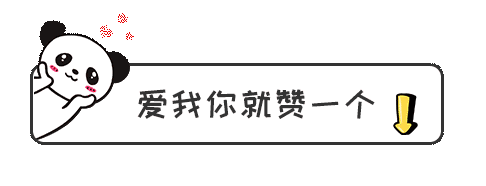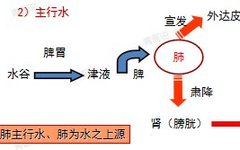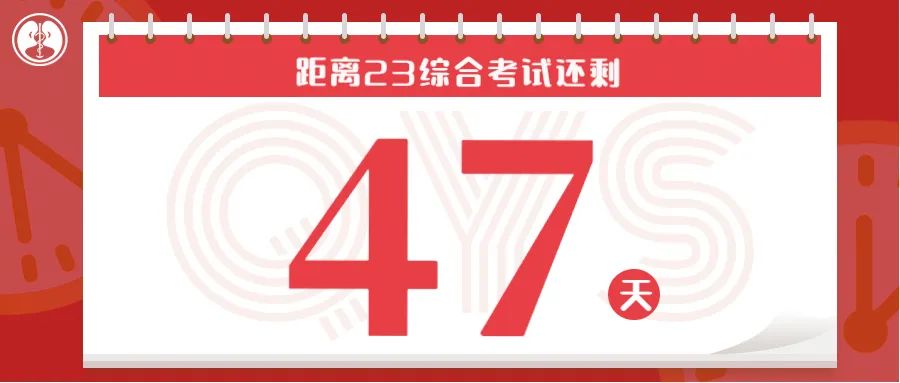
Five Organs – Heart
1. Physiological Functions
1) Governs Blood Vessels: This refers to the heart’s role in generating blood and the heart qi’s function in promoting and regulating blood flow throughout the vessels, nourishing and moistening the body.
A governs blood. B governs vessels.
2) Houses the Spirit:

The heart houses the spirit – it is responsible for overseeing all physiological activities and governs mental activities such as consciousness, thought, and emotions.
Physiological Characteristics: It is a yang organ and is characterized by clarity. The heart’s vessels are based on smoothness, and the heart spirit is based on clarity.
2. Physiological Characteristics
The heart is a yang organ and is characterized by clarity.
Heart qi deficiency.
3. Associated Functions
In the body, it connects with the vessels, its manifestation is on the face, it opens to the tongue, it corresponds to joy in emotions, and to sweat in fluids, corresponding to summer qi.
Five Organs – Lung
1. Physiological Functions
1) Governs Qi and Respiration

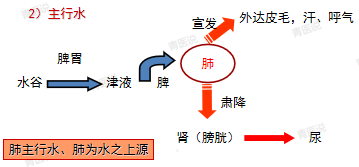
3) Governs the Hundred Vessels
Governing the hundred vessels – refers to the fact that all blood in the body converges in the lungs, where it inhales clear qi and exhales turbid qi, then distributes the blood rich in clear qi throughout the body. Essentially: Assists the heart in circulating blood.
Governs regulation – refers to the lung qi’s role in managing and regulating respiration and the qi, blood, and fluids of the entire body.
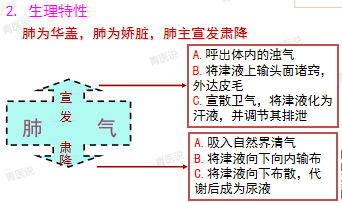
3. Associated Functions
In the body, it connects with the skin, its manifestation is in the hair, it opens to the nose, it corresponds to tears in fluids, and to sadness (grief) in emotions, corresponding to autumn qi.
Five Organs – Spleen
1. Physiological Functions
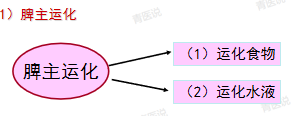
2) Governs Blood
This refers to the spleen’s function of controlling and regulating blood flow within the vessels, preventing it from leaking outside. Principle: The spleen qi’s consolidating effect (qi controls blood).
2. Physiological Characteristics
1) Spleen qi governs ascent: The spleen qi primarily functions to ascend.
① Ascends clear qi: It transports the essence of food and water to the heart and lungs, and through the heart and lungs, transforms it into qi and blood to nourish the entire body.
② Supports the internal organs: It maintains the relative stability of the internal organs’ positions, preventing them from descending.
2) Prefers dryness and dislikes dampness.
3. Associated Functions:
In the body, it connects with the flesh, its manifestation is in the lips, it opens to the mouth, it corresponds to saliva in fluids, and to thought in emotions, corresponding to the long summer qi.
Five Organs – Liver
1. Physiological Functions:
1) Governs Regulation: The liver has the function of ensuring smooth flow of qi throughout the body.
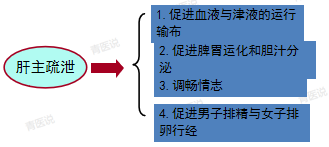
2) Governs Blood Storage: This refers to the liver’s function of storing blood, regulating blood volume, and preventing bleeding.
2. Physiological Characteristics:
The liver is a rigid organ, and it governs ascent and development.
3. Associated Functions:
In the body, it connects with the tendons, its manifestation is in the nails, it opens to the eyes, it corresponds to tears in fluids, and to anger in emotions, corresponding to spring qi.
Five Organs – Kidney
1. Physiological Functions
1) Governs Essence Storage, Growth, Development, Reproduction, and Organ Qi Transformation.

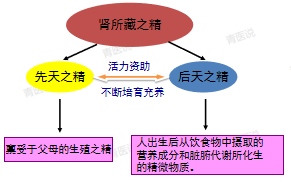
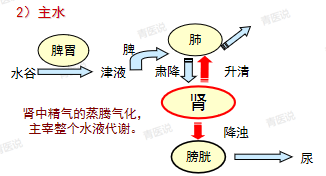
3) Governs Qi Inhalation
2. Physiological Characteristics: The kidney governs sealing and storage, and the kidney qi rises.
3. Associated Functions:
In the body, it connects with the bones and marrow, its manifestation is in the hair, it opens to the ears, it connects to the two lower yin, it corresponds to fear in emotions, and to saliva in fluids, corresponding to winter qi.
Mingmen (Gate of Life)
First mentioned in the “Lingshu – Roots and Nodes”: “The sun root is in the extreme yin, and it is connected at the Mingmen. The Mingmen is the eye.”
Location: The “Lingshu” refers to the eyes; the “Nanjing” refers to the Mingmen as an internal organ, indicating the right kidney.
Function: It governs fire, and both water and fire are governed together; neither water nor fire is the same as the kidney’s dynamic qi; currently, it is mostly recognized as: the water of the Mingmen, water = kidney yin, kidney yang.
Daily Practice  Exercises Test
Exercises Test
Answers and Analysis at the End

1. “The Source of Life” refers to
A. Liver
B. Lung
C. Heart
D. Spleen
E. Kidney
2. The organ referred to as the “Sun” of the human body by ancient physicians is
A. Liver
B. Heart
C. Spleen
D. Lung
E. Kidney
3. In the “Suwen”, the phrase “the solitary organ, the central earth nourishes the four sides” refers to which organ
A. Liver
B. Heart
C. Spleen
D. Lung
E. Kidney
4. The organ that can promote the spleen and stomach’s transformation is
A. Liver
B. Heart
C. Spleen
D. Lung
E. Kidney
5. In the “Suwen”, the phrase “the general’s office, where strategies emerge” refers to which organ
A. Liver
B. Heart
C. Spleen
D. Lung
E. Kidney
 Answers and Analysis
Answers and Analysis
1. [Correct Answer] C
[Key Phrase]
Heart = the official of the monarch + the source of life + the great master of the five organs and six bowels.
[Analysis]
The heart oversees the physiological activities of all organs, meridians, and the body, and governs consciousness, thought, and emotional activities. The spirit of the human body has both broad and narrow meanings. The broad meaning refers to the master of all life activities of the body; the narrow meaning refers to consciousness, thought, emotions, and character. The spirit housed in the heart is both the master of life activities in a broad sense and includes consciousness, thought, and emotions in a narrow sense. The “Suwen – Linglan Secret Classic” states: “The heart is the official of the monarch, and the spirit emerges from it.” The “Suwen – Six Sections of Organ Images” states: “The heart is the source of life, the transformation of the spirit.”
2. [Correct Answer] B
[Analysis]
Ancient physicians referred to the heart as the “sun” of the human body.
3. [Correct Answer] C
[Analysis]
The spleen essence primarily refers to the essence of food and water absorbed by the spleen. The spleen essence is transported by spleen qi to the other four organs, transforming into the essence of each organ, hence the saying in the “Suwen – Jade Machine True Storage” that “the spleen is the solitary organ, the central earth nourishes the four sides.”
4. [Correct Answer] A
[Analysis]
The liver’s qi regulates the ascent and descent of the spleen and stomach qi, ensuring smooth qi flow, promoting and coordinating the movements of the spleen and stomach qi, creating conditions for the normal intake and transformation of food, facilitating digestion, absorption of the essence of food, and excretion of waste.
5. [Correct Answer] A
[Analysis]
From the “Medical Classics”, a medical text by Shen Youpeng from the Qing Dynasty. The original text states: “The heart is the official of the monarch, and the spirit emerges from it; the lung is the official of the pulse, and regulates the rhythm; the liver is the official of the general, and strategies emerge from it; the gallbladder is the official of the central justice, and decisions emerge from it; the zhongzhong is the official of the minister, and joy emerges from it.” In plain language: the liver is like an organ of a general, from which strategies emerge; the zhongzhong is like an organ of a minister, from which joy emerges.

